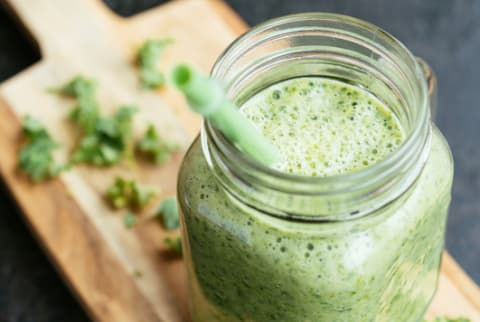Advertisement


Like many patients, 37-year-old Brenda appeared a little confused when I initially said the word starch. "But you mention in your book Happy Gut that starchy carbs turn into sugar in your body, which feeds my sugar addiction," she noted during our second visit. Feeding sugar addiction was the last thing Brenda wanted (as she was insulin-resistant and about 30 pounds overweight).
Indeed, large amounts of simple starches (usually accompanied by sugary, high-fat foods) trigger excessive amounts of your fat-storing hormone insulin—eventually leading to insulin resistance and belly fat. Among the havoc it creates, insulin resistance increases inflammation and paves the way1 for type 2 diabetes and obesity. To become leaner and healthier, you want to become insulin sensitive—meaning your body utilizes glucose for energy rather than storing it as fat. Yet like most things in life, an exception exists for every rule, and that includes starch.
What's resistant starch, and is it really good for me?
As a medical doctor who specializes in gut health, I've long valued the roles prebiotics and probiotics play in creating a happy gut and vibrant overall health. However, recently I've tuned in to the many benefits of resistant starch (RS), a prebiotic fiber that isn't digested or absorbed in your small intestine. (Hence the name resistant, since it resists digestion.) Instead, RS beelines to your colon, where healthy gut flora gobble it up and ferment it into short-chain fatty acids (SCFAs). Your colon utilizes2 those SCFAs for energy and optimal health and SCFAs favorably lower your colon's pH.
Perhaps the most well-studied is butyrate, an anti-inflammatory3 SCFA and your colon's preferred4 fuel. Among its many roles, butyrate protects your intestinal barrier by dialing down5 potential gut problems like leaky gut. The SCFAs your colon cells don't use head to your bloodstream and then liver where they provide additional anti-inflammatory benefits. When these colon bacteria ferment RS, they also boost good gut flora that crowd out the bad microbes, which can help with metabolism6, mood, immunity, and weight management7.
The benefits of starch go way beyond gut health.
Numerous studies9 have shown that even small amounts of RS can also make you more insulin-sensitive. One study showed that compared to other fibers, RS had a big impact on feelings of fullness—meaning you're less likely to reach for seconds. Another found10 that about 10 teaspoons of RS over a 24-hour period might help you better manage your appetite. And that's good news for your waistline and overall health. "Resistant starch seems to be a promising dietary fiber for the prevention or treatment of obesity and its related diseases," researchers in one study concluded.
Here's how to use RS for better health.
One of the best things about RS is that it's inexpensive and easy to incorporate into your routine. You can find it at most health food grocery stores and online—simply throw it into your breakfast protein smoothie, use it as a thickener for foods like stews and soups, or just stir it into water. If you'd like to give it a try, Bob's Red Mill gluten-free Unmodified Potato Starch seems most popular because it provides about 8 grams of RS per tablespoon and is low-carb-diet friendly. (Note: I have no affiliation with Bob's Red Mill.)
But before you rush out to buy RS, take note that more is definitely not better. Banish any notions that loading up on RS will help you ditch 10 pounds by this weekend. Too much too soon will create miserable bloating, discomfort, and abdominal pain.
Brenda started with a tablespoon in her morning protein shake and gradually increased that amount. She found about 3 tablespoons daily was her cutoff point, but everyone's RS mileage varies. If you notice bloating or other unpleasant side effects, back off or divide the RS dose throughout your day rather than all at once. You can also get RS in foods like chicory, onions, garlic, green bananas, and dandelion greens. But to get its full benefits, you'll probably want to supplement.

Vincent M. Pedre, M.D., medical director of Pedre Integrative Health and president of Dr. Pedre Wellness, is a board-certified internist in private practice in New York City since 2004. He completed his bachelor’s degree in Biology at Cornell University before attending the University of Miami School of Medicine and completed his residency in Internal Medicine at the Mount Sinai School of Medicine. He has appeared on the Martha Stewart Show and ABC and is the author of Happy Gut: The Cleansing Program to Help You Lose Weight, Gain Energy, and Eliminate Pain. Dr. Pedre is a clinical instructor in medicine at the Mount Sinai School of Medicine and is certified in yoga and medical acupuncture.
More from the author:
Functional Nutrition Training
Check out Functional Nutrition Coaching
A cutting-edge nutrition deep dive taught by 20+ top health & wellness experts
Learn moreMore from the author:
Functional Nutrition Training
Check out Functional Nutrition Coaching
A cutting-edge nutrition deep dive taught by 20+ top health & wellness experts
Learn more
Vincent M. Pedre, M.D., medical director of Pedre Integrative Health and president of Dr. Pedre Wellness, is a board-certified internist in private practice in New York City since 2004. He completed his bachelor’s degree in Biology at Cornell University before attending the University of Miami School of Medicine and completed his residency in Internal Medicine at the Mount Sinai School of Medicine. He has appeared on the Martha Stewart Show and ABC and is the author of Happy Gut: The Cleansing Program to Help You Lose Weight, Gain Energy, and Eliminate Pain. Dr. Pedre is a clinical instructor in medicine at the Mount Sinai School of Medicine and is certified in yoga and medical acupuncture.
10 Sources
- https://www.ncbi.nlm.nih.gov/pubmed/14698276
- https://www.ncbi.nlm.nih.gov/pmc/articles/PMC4220782/
- https://www.ncbi.nlm.nih.gov/pubmed/11024006
- https://www.ncbi.nlm.nih.gov/pmc/articles/PMC1374636/pdf/gut00535-0085.pdf
- https://www.ncbi.nlm.nih.gov/pubmed/10535469
- https://www.ncbi.nlm.nih.gov/pmc/articles/PMC4290017/
- https://www.ncbi.nlm.nih.gov/pubmed/25372730
- https://www.ncbi.nlm.nih.gov/pubmed/15287677
- https://www.ncbi.nlm.nih.gov/pubmed/20536509
- https://www.ncbi.nlm.nih.gov/pubmed/19857367

These 6 Simple Steps Will Make The Age Of Aquarius Your Best Era Yet
Perpetua Neo, DClinPsy

These 6 Simple Steps Will Make The Age Of Aquarius Your Best Era Yet
Perpetua Neo, DClinPsy

These 6 Simple Steps Will Make The Age Of Aquarius Your Best Era Yet
Perpetua Neo, DClinPsy

These 6 Simple Steps Will Make The Age Of Aquarius Your Best Era Yet
Perpetua Neo, DClinPsy









